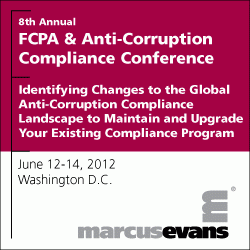The National Law Review is pleased to bring you information about the upcoming 8th FCPA & Anti-Corruption Compliance Conference:

8th FCPA and Anti-Corruption Compliance Conference
Identifying Changes to the Global Anti-Corruption Compliance Landscape to Maintain and Upgrade Your Existing Compliance Program
Event Date: 12-14 Jun 2012
Location: Washington, DC, USA
Beyond dealing with the FCPA and UK Bribery Act, there are upcoming changes to global Anti-Compliance initiatives being enacted by other major countries. It is imperative that organizations are made aware of these new rules and regulations to be able to meld them all into their organization’s anti-corruption compliance program. Maintaining a robust global compliance program along with performing proper and detailed 3rd party due diligence is of the upmost importance.
Marcus Evans invites you to attend our 8th Annual Anti-Corruption & FCPA Conference. Hear from leading executives within various industries on how to identify new areas of concern when dealing with bribery or working within a company to update an anti-corruption compliance program.
Attending this event will allow you to learn how to mitigate the effects of any possible instances of corruption and bribery both at home and abroad. Discuss solutions and best practices that companies have found when dealing with their anti-corruption compliance programs. This conference will not only review the newest enforcement cases, but also highlight practical solutions to problems dealing with FCPA and global anti-corruption measures.
Attending this conference will allow you to:
-Overcome the issues in dealing and conducting an internal investigation with Dell
-Identify anti-corruption liability concerns for US companies when engaging in Joint Ventures and Mergers and Acquisitions with Crane Co.
-Perform anti-corruption audits to better identify gaps in the compliance program with SojitzCorporation of America
-Promote a culture of ethics within an organization to combat non-compliance with Morgan Stanley
-Assess the continued challenges in conducting a 3rd party due diligence program with Parker Drilling
The marcus evans 8th Annual Anti-Corruption & FCPA Conference is a highly intensive, content-driven event that includes, workshops, presentations and panel discussions, over three days. This conference aims to bring together heads, VP’s, directors, chief compliance officers, and in-house counsel in order to provide an intimate atmosphere for both delegates and speakers.
This is not a trade show; our 8th Annual Anti-Corruption & FCPA Conference is targeted at a focused group of senior level executives to maintain an intimate atmosphere for the delegates and speakers. Since we are not a vendor driven conference, the higher level focus allows delegates to network with their industry peers.





